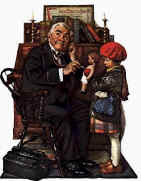Helping Your Child's Physical Development
A child's growth is a continuous process, a gradual sequencing from one stage of physical and mental development to another-"Each child sits before he stands; he babbles before he talks" (Gesell). It's a marvelous process to watch and a marvelous opportunity for parents to foster and implement important periods of growth.
At School
In reality, the responsibility of the parent is twofold. Not only should proper emphasis be placed on movement and exercise in the home but whenever possible the school's approach to physical education should be monitored. A good P.E. program in elementary school ideally will offer three or four periods a week of 45-60 minutes' duration. The program need not necessarily be highly structured and should certainly not be highly competitive. Movement is the key, and that can include simple activities (running in place, jumping jacks) and games (Simon Says, Twister). The P.E. program should progress developmentally from grade to grade and should be designed to offer maximum benefit to every child, no matter how small or Late-maturing.
A word of caution: Parents must be careful of physical conditions that might limit a child's movements and participation. Most schools ask, for their records, that a medical report be on file at the school, but it is the parent's responsibility to see that the report is accurate and up to date and that everyone on the faculty who needs to be aware of the report knows about it.
In the Community
For youngsters who are interested in competitive sports, almost every community offers after-school and summer sports such as soccer, baseball, and football. But these highly organized activities can promote stress if emphasis is placed on winning rather than just enjoying the game. An observant parent can usually quickly tell if the child is paying a high emotional price rather than just having fun. And it should be noted that in some highly organized sports, the youngsters spend more time standing around and watching than actually participating.
The local YMCA and YWCA usually offer well-rounded pro- grams that include fitness exercises and swimming The fitness program may consist of carefully structured aerobics, and the swimming program is usually designed for individual mastery rather than competition.
continue story below
At Home
Parents are enormously busy people-perhaps both parents work outside the family; perhaps there are several children in the family with differing needs and demands; perhaps it is a one-parent family. The activities that follow are offered with precisely those situations in mind. They are simple, inexpensive, enjoyable, arid can be adapted for groups (the whole family and/or friends) as well as for individual youngsters.
Simple Motor Activities
Keep a simple record of your child's physical development. Every year on his birthday, write down his weight and height. Find a convenient wall space, place a ruler on the child's head, draw a line, and date it. Children love to watch how much they have grown. While your child is standing in place, have him count the number of times he can go up and down on his toes.
Set aside time in the family schedule for a family walk, perhaps just 15 minutes, or a Saturday afternoon leisurely hike for an hour or more depending on the youngster's age and stamina. A family walk is a great way for parents and siblings to interact and chat-something that is often difficult to fit into the busy lifestyles of the nuclear family. Walks can also provide an in-depth look at changes in Mother Nature and the community during different seasons of the year.
And then there are the very simple motor activities: hopping, jumping, skipping, and climbing. All are important in a child's growth patterns. Each one calls upon various muscle groups to require extensive use.
Remember hopscotch? All that is needed is a piece of chalk and a couple of pebbles. If parents will recall their own childhood, they may tap into some games that were fun and that, without knowing it; build strong bones and muscles.
Try rolling-on a level plane or on a hill. Inside. Outside. How many different ways can the child roll? Arms outstretched; arms at sides; one arm stretched the other to the side, Slow rolls. Fast rolls.
Head and neck exercises. Turn head side to side, down and up, while standing, sitting, lying on the back and on the stomach.
Have the child walk across a fallen log or along a narrow curb. Have him repeat the walk, holding a bulky object in one hand, then the other hand, over his head. Repeat going backward and sideways.
Row a boat on dry land. The child must calculate which oat to use in order to turn a specific direction. (The parent will have to figure this out first!)
Water activities for pool, lake, or rub (be prepared to get splashed!). Hold a ball and ask the child to hit it with his hands (right and left), elbows, knees, feet. If swimming lessons are available, enroll your youngster. The earlier, the better.
Just tossing a ball from parent to child is excellent for eye-hand coordination as well as large muscles. Don't let the activity get boring. Vary it by asking the child to kick the ball (using alternate feet) or batting it (with alternate hands). Ball size is important. Large enough for a success experience. Small enough for a challenging experience.
Don't forget beanbags-quite a different experience from throwing or catching a ball. Let the child toss and catch it himself-standing, sitting, lying down, alternate hands. Can he catch it on the top of his hand? a shoulder? a knee? a foot?
Differing chairs. The child sits down and gets up from chairs and stools of varying heights, descending and standing up slowly and without using his hands. The lower the chair, the more difficult the task.
Kangaroo hop. Have the child hold something (for example, a beanbag-or if you want to make it difficult, an apple or an orange) between his knees, then jump with feet together. Front wards, backwards, sideways.
Save your large bleach bottles. With the bottoms cut off, they make nice scoops for catching games, using tight objects such as a whiffle ball or beanbag.
Wheelbarrow. Hold the child's legs white he "walks', with his hands along a marked route.
Find a place where the child can see his shadow. Then see how creative you can be in directing his activities: "Make your shadow tall, short, wide, thin, make it jump, stand on one foot, touch its feet," etc.
Most of the activities that have been described can, for the most part, be done inside or out. It is important that they be done in a spirit of good fun and recreation. Once they become a chore, the child, either subtly or overtly, will decrease his effort and the sought after physical development will diminish. The secret probably ties in offering a variety of activities with an attitude of good cheer. And there may be a bonus - parents may discover that they, too, are in better shape!
continue story below
next: Birth Order
APA Reference
Staff, H.
(2008, December 1). Helping Your Child's Physical Development, HealthyPlace. Retrieved
on 2026, March 4 from https://www.healthyplace.com/parenting/child-development-institute/helping-your-childs-physical-development
 In the course of speaking publicly about anorexia, I have heard the anguish in hundreds of voices as they've said, "She is such a beautiful girl, she doesn't need to diet --- if she would just eat." It seems so obvious, she's underweight and needs to gain weight --- if she would 'just eat' everything would be 'just fine.' Unfortunately, it is not that simple at all. Whenever you find yourself tempted to believe that the solution is for her to "just eat," it may be helpful for you to remember that people develop anorexia for many different reasons. Remind yourself often that anorexia recovery is a complicated process that requires more than simply facing fears related to food and weight and learning to cope with them. It is a process that demands a deep introspective look at one's life and at one's own self. It is a process which necessitates exploring one's wants, needs, and desires for the individual herself as well as for her life in general. Recovery compels the individual to examine the underlying issues that led to the development of her anorexia in the first place. Dealing with and reconciling all of the thoughts and feelings attached to each of these areas takes time and patience from everyone involved. You may already understand that recovery requires a good deal of motivation and effort from the individual herself, and your knowing this may cause you to wonder if there is anything you can you do that will positively impact her recovery process. And there are in fact many things that you can do throughout her recovery process that can make a world of difference --- for both of you.
In the course of speaking publicly about anorexia, I have heard the anguish in hundreds of voices as they've said, "She is such a beautiful girl, she doesn't need to diet --- if she would just eat." It seems so obvious, she's underweight and needs to gain weight --- if she would 'just eat' everything would be 'just fine.' Unfortunately, it is not that simple at all. Whenever you find yourself tempted to believe that the solution is for her to "just eat," it may be helpful for you to remember that people develop anorexia for many different reasons. Remind yourself often that anorexia recovery is a complicated process that requires more than simply facing fears related to food and weight and learning to cope with them. It is a process that demands a deep introspective look at one's life and at one's own self. It is a process which necessitates exploring one's wants, needs, and desires for the individual herself as well as for her life in general. Recovery compels the individual to examine the underlying issues that led to the development of her anorexia in the first place. Dealing with and reconciling all of the thoughts and feelings attached to each of these areas takes time and patience from everyone involved. You may already understand that recovery requires a good deal of motivation and effort from the individual herself, and your knowing this may cause you to wonder if there is anything you can you do that will positively impact her recovery process. And there are in fact many things that you can do throughout her recovery process that can make a world of difference --- for both of you. For over twenty years, I've been working in the field of eating disorders. Throughout this time, and probably forever, I keep learning from my clients, their friends and families and other important associates. I see who recovers from eating disorders and who is not yet ready or able to do the work that leads to eating disorders recovery.
For over twenty years, I've been working in the field of eating disorders. Throughout this time, and probably forever, I keep learning from my clients, their friends and families and other important associates. I see who recovers from eating disorders and who is not yet ready or able to do the work that leads to eating disorders recovery. How do you structure your day? Do you start with every morning off by doing the things you have to do but don't necessarily enjoy and put the more enjoyable parts of your day off until later? Most of us spend very little time doing the things that we do best. Since we tend to enjoy the things we do best, then it follows that most of us spend most of our time doing things that we don't really enjoy. Instead, we spend the majority of our days struggling to do things that we don't like to do. Then we wonder why we don't want to get out of bed in the morning to go to work. Working this way drains your energy and decreases your ability to succeed at what you are trying to accomplish.
How do you structure your day? Do you start with every morning off by doing the things you have to do but don't necessarily enjoy and put the more enjoyable parts of your day off until later? Most of us spend very little time doing the things that we do best. Since we tend to enjoy the things we do best, then it follows that most of us spend most of our time doing things that we don't really enjoy. Instead, we spend the majority of our days struggling to do things that we don't like to do. Then we wonder why we don't want to get out of bed in the morning to go to work. Working this way drains your energy and decreases your ability to succeed at what you are trying to accomplish.
